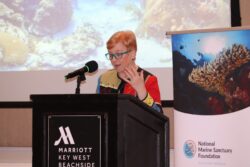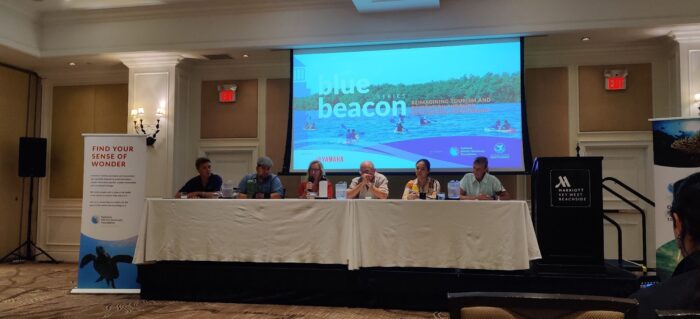Blue Beacon: Reimagining Tourism and Recreation through Destination Stewardship
![]()
The National Marine Sanctuary Foundation in partnership with NOAA’s Office of National Marine Sanctuaries hosted a Blue Beacon Series event, sponsored by Yamaha Motors, in Key West, Florida on April 22, 2023. The Blue Beacon Series aims to bring to light the ocean and Great Lakes’ biggest challenges through panels, lectures, and film screenings hosted around the country in order to build communities of support for marine protected areas.
The event focused on reimagining recreation and tourism through a destination stewardship framework, which incorporates sustainable and regenerative tourism practices to protect both cultural and natural systems in places like national marine sanctuaries. Experts from the hospitality, marketing, research, outdoor recreation and tourism sectors provided case studies showing how recreation and tourism can protect cultural and natural systems in marine areas while supporting equitable experiences, resilient communities and a prosperous blue economy.
 The event featured a keynote address by the acting director of the U.S. Department of Commerce’s (DOC) National Travel & Tourism Office, Julie Heizer. Ms. Heizer’s remarks emphasized that recreation and tourism are economic engines, while simultaneously supporting local, regional, national, and international economies. Ms. Heizer referenced the National Travel and Tourism Strategy, and indicated that with the post-COVID rebound of international and domestic travelers, marine resource managers must plan for heightened levels of tourism and consider how to build resiliency in partnership with communities and the tourism industry.
The event featured a keynote address by the acting director of the U.S. Department of Commerce’s (DOC) National Travel & Tourism Office, Julie Heizer. Ms. Heizer’s remarks emphasized that recreation and tourism are economic engines, while simultaneously supporting local, regional, national, and international economies. Ms. Heizer referenced the National Travel and Tourism Strategy, and indicated that with the post-COVID rebound of international and domestic travelers, marine resource managers must plan for heightened levels of tourism and consider how to build resiliency in partnership with communities and the tourism industry.
Climate resilient communities, equitable access, and inclusion of communities as partners for shared stewardship of special places, such as national marine sanctuaries, were among the common themes discussed.
The keynote was followed by a national roundtable with industry and research leaders to discuss “Harnessing Sustainable Tourism for a Regenerative Economy.” Concurrent sessions highlighted national and local experts to discuss “Destination Stewardship,” “Regenerative Tourism and Voluntourism, and “Investments in Sustainable Tourism.”
Panelists included DOC’s Commercial Services, Solimar International, Leave No Trace, Cultural Heritage Economic Alliance/ Blacks in Travel and Tourism, Iberostar Group, Ocean Education International, Arizona State University, University of Southern Florida, Sonoma County Tourism (CA), Monroe County Tourism (FL), Surfrider, and Blue Star operators in the Florida Keys. They provided case studies and examples of lessons to consider for future efforts throughout the sanctuary system. While the audience was comprised of local and national tourism minded individuals, students from the School of Hospitality and Tourism Management at the University of South Florida were a highly engaged addition.

Panelists on Destination Stewardship concurrent session from left to right: Will Benson, One World Angling and Blue Star Fishing Guide; David Riera, Hispanic Access Foundation; Whitney Wemett, Board Chair, Surfrider Florida Keys Chapter; Alex Brylske, Ph.D., President, Ocean Education International; Megan Morikawa, Global Director of Sustainability Office at Iberostar Group; and Kelly Bricker, Professor, Sustainable Tourism, Ecotourism & Nature-based Recreation, Arizona State University.
Participants exchanged knowledge, best practices and lessons learned needed to advance sanctuaries’ priorities in support of climate resilient communities and equitable access while protecting marine ecosystems through “destination stewardship.” Overall, the conversations were dynamic, and just the beginning of a larger dialogue about how we transform the thinking of recreation and tourism in sanctuaries as an opportunity for engagement and shared stewardship.
Visit National Marine Sanctuaries!
Roundtable on Harnessing Sustainable Tourism for a Regenerative Economy
Fifty percent of travelers are making more climate-friendly travel choices.1 Fifty-nine percent of travelers say they want to leave the places they visit better than when they arrived.2 By promoting a regenerative economy centered in sustainable tourism, communities, in partnership with National Marine Sanctuaries, become highly desired international travel destinations.
Following a roundtable discussion on “Harnessing Sustainable Tourism for a Regenerative Economy,” participants chose between three concurrent breakout sessions featuring expert panelists on various sustainable and/or regenerative tourism and responsible recreation topics.
Destination Stewardship
Successful community-based tourism relies on healthy and climate resilient communities and businesses to be able to sustainably support local economies. To “build back better,” these communities and businesses can work in partnership with the National Marine Sanctuary System through a destination stewardship approach. This multi-stakeholder approach prioritizes the shared protection and conservation of resources to ensure a healthy destination that supports tourism. To do so, community led initiatives need to be brought to the forefront of planning. Businesses need to contribute back to support healthier marine ecosystems, regenerative economies, and integrate with the community and local culture. This discussion focused on how businesses and communities can contribute to and benefit from a healthy marine environment through the use of a destination stewardship approach.
Aspirations of Regenerative Tourism and Voluntourism
Regenerative tourism moves beyond sustainable tourism, where community members and travelers not only want to protect an area, but intend to leave a destination (national marine sanctuary) better than it was before they arrived. As an emerging mindset, regenerative tourism and voluntourism create an opportunity for new ways for tourists to interact with a destination and potentially an attachment to these places and a sense of place-based stewardship. Established citizen science programs in a destination can be used for voluntourism. This discussion focused on the role regenerative tourism and voluntourism can play in the National Marine Sanctuary System.
Investments in Sustainable Tourism
What could success look like for sustainable tourism? This discussion focused on what a tourism destination site and adjacent communities’ need for infrastructure investments, innovative conservation tools, and community enrichment to create equitable experiences for all visitors.
A full list of speaker biographies can be found here.
This was the second event in 2023 of the Foundation’s Blue Beacon Series, which brings to light the pressing issues facing our ocean and Great Lakes. We hope you will join us on November 16 for the next Blue Beacon Series event in Portland, ME, as we discuss kelp aquaculture. For more information, visit marinesanctuary.org/bluebeacon.
